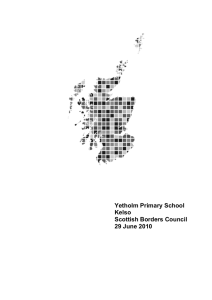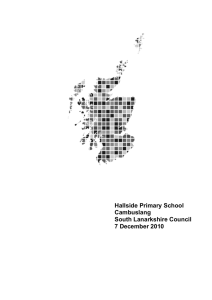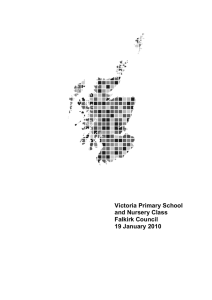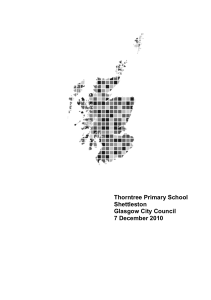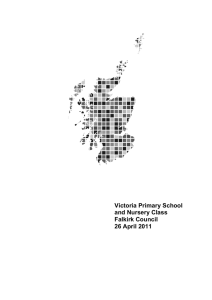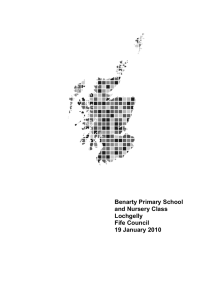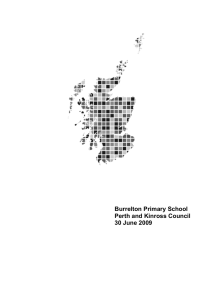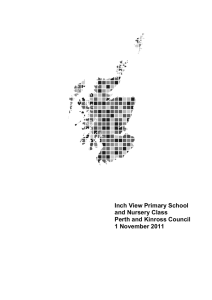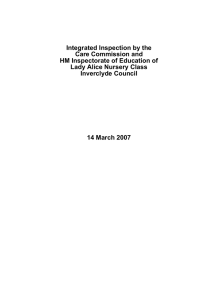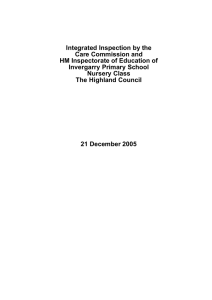Integrated Inspection by the Care Commission and HM Inspectorate of Education of
advertisement
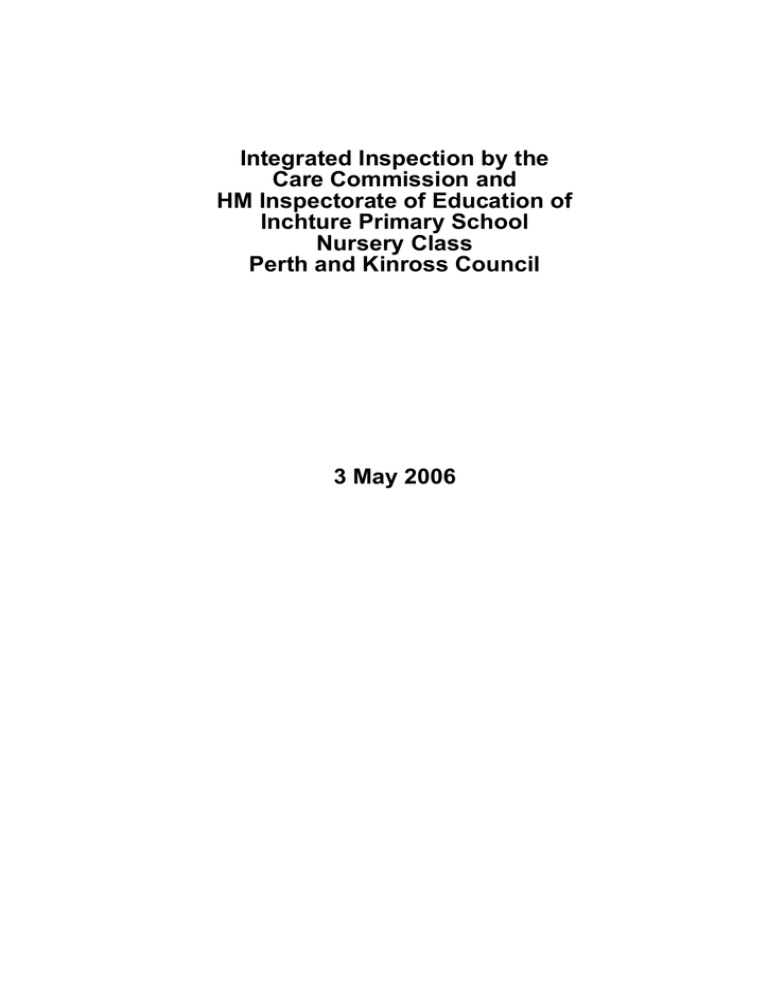
Integrated Inspection by the Care Commission and HM Inspectorate of Education of Inchture Primary School Nursery Class Perth and Kinross Council 3 May 2006 Inchture Primary School Nursery Class Main Street Inchture PH14 9RT The Regulation of Care (Scotland) Act, 2001, requires that the Care Commission inspect all care services covered by the Act every year to monitor the quality of care provided. In accordance with the Act, the Care Commission and HM Inspectorate of Education carry out integrated inspections of the quality of care and education. In doing this, inspection teams take account of National Care Standards, Early Education and Childcare up to the age of 16, and The Child at the Centre. The following standards and related quality indicators were used in the recent inspection. National Care Standard Child at the Centre Quality Indicator Standard 2 – A Safe Environment Resources Standard 4 – Engaging with Children Development and learning through play Standard 5 – Quality of Experience Curriculum Children’s development and learning Support for children and families Standard 6 – Support and Development Standard 14 – Well-managed Service Management, Leadership and Quality Assurance Evaluations made using HMIE quality indicators use the following scale, and these words are used in the report to describe the team’s judgements: Very good Good Fair Unsatisfactory : : : : major strengths strengths outweigh weaknesses some important weaknesses major weaknesses Reports contain Recommendations which are intended to support improvements in the quality of service. Any Requirements refer to actions which must be taken by service providers to ensure that regulations are met and there is compliance with relevant legislation. In these cases the regulation(s) to which requirements refer will be noted clearly and timescales given. HOW TO CONTACT US If you would like an additional copy of this report Copies of this report have been sent to the acting headteacher, staff and the education authority. Copies are also available on the Care Commission website: www.carecommission.com and HMIE website: www.hmie.gov.uk. If you wish to comment about integrated pre-school inspections Should you wish to comment on any aspect of integrated pre-school inspections, you should write in the first instance to Kenneth Muir, HMCI, at HM Inspectorate of Education, Denholm House, Almondvale Business Park, Almondvale Way, Livingston EH54 6GA. Our complaints procedure If you have a concern about this report, you should write in the first instance to either: Complaints Coordinator Headquarters Care Commission Compass House Riverside Drive Dundee DD1 4NY Hazel Dewart HM Inspectorate of Education Denholm House Almondvale Business Park Almondvale Way Livingston EH54 6GA If you are not satisfied with the action we have taken at the end of our complaints procedure, you can raise your complaint with the Scottish Public Services Ombudsman. The Scottish Public Services Ombudsman is fully independent and has powers to investigate complaints about Government departments and agencies. You can write to The Scottish Public Services Ombudsman, 4-6 Melville Street, Edinburgh EH3 7NS. You can also telephone 0870 011 5378 or e-mail enquiries@scottishombudsman.org.uk. More information about the Ombudsman’s office can be obtained from the website: www.scottishombudsman.org.uk. A copy of the HMIE complaints procedure is available from the HMIE website at www.hmie.gov.uk or by telephoning 01506 600 258. Crown Copyright 2006 Care Commission HM Inspectorate of Education This report may be reproduced in whole or in part, except for commercial purposes or in connection with a prospectus or advertisement, provided that the source and date thereof are stated. _______________________________ Integrated Inspection by the Care Commission and HM Inspectorate of Education of Inchture Primary School Nursery Class Perth and Kinross Council Introduction Inchture Primary School Nursery Class was inspected in January 2006 as part of the integrated inspection programme by the Care Commission and HM Inspectorate of Education. An inspection of the primary school was carried out at the same time by HMIE and is the subject of a separate report. The nursery catered for pre-school children aged three to five years. It was registered for 20 children attending at any one session. At the time of the inspection the total roll was 22. The environment Standard 2 The nursery was an integral part of the primary school. The room was open plan and had easy access to the P1 and P2 classrooms. This layout encouraged and supported good working relationships with P1. The nursery had a secure entry system and staff managed the arrival and departure of the children effectively. The playroom was in an adequate state of repair and equipment was clean and well maintained. Appropriate measures were in place to control the spread of infection. Staff had set out a wide range of play experiences but access to resources was restricted by the layout and organisation of some areas. The space available enabled children to work in small groups but there were limited opportunities for large-group work. Children had direct access to an enclosed outdoor play area which had been developed to offer more space. Improvements in the supervision of children when moving to other play areas, the height of computer furniture and a clear written system to manage and implement infection control issues were required. Quality of children’s experience Standard 4 & 5 Staff had good relationships with children and had created a caring environment in which children were happy. They knew the children well and used praise and encouragement to develop children’s self esteem and confidence. Children had access to a wide range of activities and most made effective use of them. Staff did not always intervene effectively enough to extend children’s play and make it more challenging. They should improve the balance of free and more structured activity. Early 1 literacy and numeracy activities were set firmly in the context of play. Staff plans included the key aspects of children’s learning and development and stated clearly what children were expected to learn. Observations of children at play in the activity areas were carried out, but staff should now concentrate on more regular observations of children and use the information to inform their planning. Folders containing samples of children’s work were kept to help identify progress. The local authority tracking system was also used to help prepare reports to parents and the P1 teacher. Features of the programmes for children included the following. 2 • The programme for emotional, personal and social development was good. Children were happy and familiar with the daily routines of the nursery. They were learning to share and take turns by playing games and using a timer at the computer. They were developing friendships and most cooperated well with each other in play situations. Staff encouraged children to be independent in their personal tasks and children were learning basic rules of hygiene. However, some children required more encouragement to persevere with tasks and help at tidy-up time. • The programme for communication and language was good. Children listened well at story time and talked to one another during play and in small-group situations. Staff had provided a range of fiction and non-fiction books in the book corner but children did not choose to use this area very often. Children had numerous opportunities to recognise their name in print and all could do so. Children’s interests and skills in early writing were being developed through a well-equipped writing area. • The programme for knowledge and understanding of the world was fair. Children used computer programmes to develop their skills in information and communications technology and mathematics. Staff had provided simple sorting and matching activities which children used at various times throughout the session. However, more adult involvement would have added to the challenge of these activities. Children were becoming familiar with their local environment and the changing of the seasons through nature walks. They were learning to use their senses to appreciate the world around them. Children had access to sand and water play. Staff should now provide more challenging opportunities for children to develop their skills of investigation and simple problem solving. • The programme for expressive and aesthetic development was fair. Staff provided children with a range of suitable materials to develop their skills in painting, gluing, drawing and the use of play dough. Children enjoyed taking part in some role-play but would benefit from a different layout to this area and a wider range of contexts for imaginative play. Staff had made a book of a wide selection of children’s songs and also provided a very good selection of musical instruments. They should now ensure children have the opportunity to access this resource on a regular basis. • The programme for physical development and movement was good. Children were developing good control of their fingers and hands through use of pencils, brushes, scissors, jigsaws and small construction. Staff made regular use of the school gym to provide opportunities for energetic play. Children also benefited from visits by the physical education teacher. They had daily access to the outside area and good opportunities to develop their confidence and skill using large apparatus and wheeled toys. Support for children and families Standard 6 Staff had good relationships with children and responded well to individual needs and circumstances. The majority of parents who responded to the pre-inspection questionnaire were happy with most aspects of the provision. The nursery used newsletters, a notice board, informal daily discussions and parents’ open nights to communicate with parents. However, parents wanted more information about the work of the nursery and their child’s progress, and more challenging activities for their children. They also wanted the inappropriate behaviour of children better managed. Staff were familiar with the arrangements necessary to provide support for children with additional needs. They had established useful links with a range of agencies. Management Standard 14 The recently-appointed acting headteacher provided good leadership. She was supportive of nursery staff and committed to the future development of the nursery. She had a very good professional knowledge of early years education and had correctly identified areas needing further development. Staff had access to a comprehensive set of policies to assist them with their work and these were also made available to parents. Staff needed to follow more closely the procedure for recording complaints. Systems for professional review and development provided good opportunities for staff to discuss their professional needs and access further training. All staff had been trained in child protection procedures and all were aware of the implications of the Scottish Social Services Council Codes of Practice. The acting headteacher had developed a systematic programme of monitoring and evaluation which included all areas of the curriculum. She carried out formal monitoring twice a term and informal monitoring when possible. She monitored the medium-term plans and provided written feedback to staff. Nursery staff were included in the self-evaluation process and the issues identified formed part of the school development plan. Key strengths • The welcoming and caring environment and the good relationships between staff and children. • The good relationships formed between headteacher and staff. 3 Recommendations for improvement • Staff should review and develop the layout of the room to improve supervision, access to resources and opportunities for learning. • Staff should improve the quality of their observations and assessments of children’s learning and use assessment information to plan appropriate next steps. • Staff should improve the balance between free play and more adult-led activities. • Staff should provide more challenging activities for some children and improve aspects of programmes as set out in the report. • Staff should address the issues raised by parents in the pre-inspection questionnaire. • Staff should ensure that the computer furniture is a suitable size for children. • The acting headteacher should ensure that all staff are familiar with and implement infection control procedures. • Staff must ensure safety systems are in place to ensure that all children are accounted for when moving to another area of the school. This is in order to comply with: Scottish Statutory Instrument 2002 Number 114 Regulation 4(1)(a) Timescale for implementation: immediate action required at the inspection. • Staff must record complaints and the action taken. This is in order to comply with: Scottish Statutory Instrument 2002 Number 114 Regulation 25(4) Timescale for implementation: One month from receipt of the inspection report. Requirements Care Commission Officers and HM Inspectors have asked the pre-school centre and education authority to prepare an action plan indicating how they will address the main findings of the report. Where requirements are made, the action plan should include timescales to deal with these. The plan will be available to parents and carers. In liaison with the pre-school centre and education authority, Care Commission Officers and HM Inspectors will monitor progress to ensure improvements are in line with the main findings of the report. Kiran Sirpal Care Commission 4 Hazel Danskin HM Inspectorate of Education
